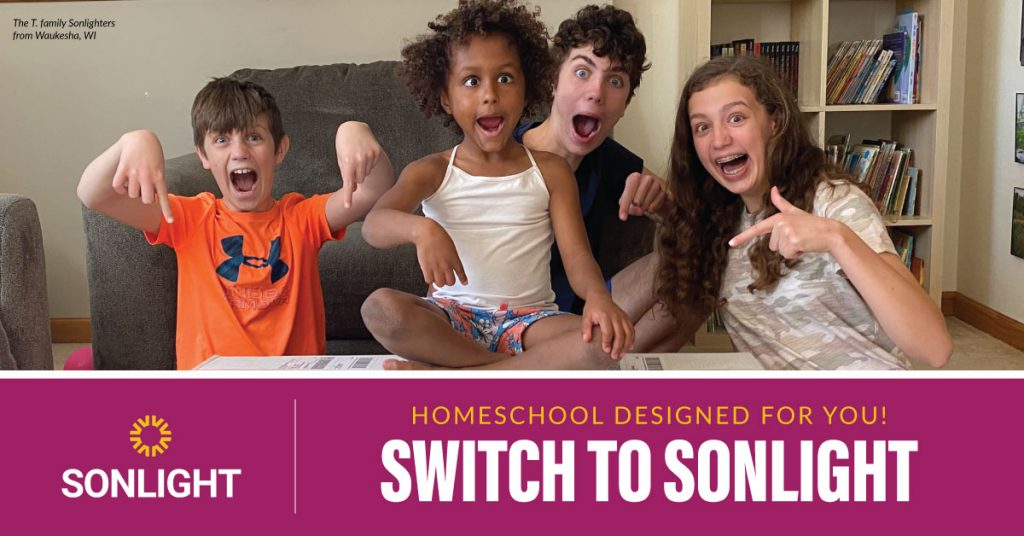
We’ve all been there: those days when you just aren’t sure you are doing enough. When you’re certain the school down the street will do a better job that you can. Times you are so frustrated you figure it just can’t hurt to try public school for one short semester.
Parenting is full of doubts. Homeschooling, even more so. However, when those doubts hit, anchor yourself in the truth that sending your kids to public school won't solve your problems.
Students Outnumber Teachers
Yes, there are some great teachers in schools. However, your child will not be surrounded by great teachers. Instead they are surrounded by peers. Thus the majority of what they will learn will come from other students.
This would be fine if we could pick the students in the class and control their behaviors. But their classroom will have children whose parents’ have a mix of standards of proper behavior. Some will be similar to those your family has; others will have vastly different standards.
My oldest daughter has a cousin her age. They were born weeks apart and until age 4 played together beautifully. However, at age 4, her cousin started preschool, and she did not. Within weeks, I noticed a change in her cousin’s behavior. He started becoming more abusive, pushing and pulling and grabbing toys. He started swearing and using words his mother and I didn’t allow our children to use. Also he started lying to his mother and trying to hide things from her. When his mother asked why he was behaving such, he explained that was how the boys in his class acted.
Not every child will pick up negative behaviors from public school. But many will, especially those who are easily influenced by others.
You’ll Still Have Homework
Unfortunately, just because schools assume the bulk of the teaching doesn’t mean that they manage to get all the seat work done in the classroom. Even schools that state they don’t send homework home for students to complete, will often recommend extra work at home:
- 20 minutes of reading aloud with a parent each evening
- memorize spelling lists
- finish worksheets still incomplete from class
- work on big projects
In schools that do send home homework, even children as young as kindergarten might have up to an hour or more each evening. You may find that you are spending a greater percentage of the time with your children on schoolwork than when you homeschooled!
Only now, you’ll be less in control of what they are learning and how they are learning it.
School Discipline May Not Carry Over to the Home
Schools have a job to do, and that is to impart academic knowledge. If your child’s issues are behavioral in nature, school generally doesn’t fix those issues at all. It’s true teachers do expect respect and intervene when children misbehave. But self-control in the classroom doesn't always transfer over to home life.
Schools won’t make your child stop fighting you on every issue, or stop talking back to you, or make them obey the first time you say something. Schools won’t improve their attitude toward siblings.
In fact, schools may make all of these problems worse. Your child will be exposed to new ways to talk back, friends who delight in trying to outdo each other on the rebellion scale, and children who are willing to introduce your child to new temptations. Because you and your child will be spending less time together, and they will be spending less time with their siblings, you might find the distance between you growing.
It’s not uncommon for children to treat teachers with one set of attitudes, friends with another, and parents with yet another.
You Get the Leftovers
Once your child enrolls in school, the system gets the best parts of your child. The school gets them when they are fresh in the morning, 5 days a week.
You get what’s left over:
- The early mornings when they don’t want to wake up.
- The evenings when they are tired from eight hours of focused education and don’t want to do their homework.
- The weekends when you try to cram in all the fun things you’d like to do.
- The days off when everything is crowded because everyone else is off, too.
- The attitude left over from trying to be good for so long in the day.
- All the day’s frustrations when they have reached their boiling point.
Their brightest smiles will be shared with their friends, not their parents and siblings.
With homeschooling, you get it all—the good and the bad. When your kids attend public schools, the teachers and friends seem to get the bulk of the good while you’re left holding more and more of the bad.
This isn’t to say there aren’t positive things that can come from sending them to school, or that they’ll always be in a bad mood. That certainly isn’t the case with most children. But you will get less of the good.

Teachers Have Agendas, Too
Most teachers choose the education profession with the intention of building up students. They work tirelessly for little reward and even less thanks. They deal with all kinds of students and parents on a daily basis.
But, teachers are all different. They come from different families with different values and different ideas. So, you will, from time to time, run into a teacher whose values are very different from yours.
- You might find your child has a teacher who likes bringing LGBTQ issues into the daily discussions, and you don’t agree with their viewpoints on the lifestyles.
- You might find your teacher is an atheist, and your values are strictly Christian in nature.
- Their teacher might belittle any notion of Creationism, when your family happens to be devout in believing the Earth is young.
- Or, perhaps their teacher (or your school district) believes in teaching sexual education as young as first and second grade, while you aren’t comfortable with the amount of detail they provide.
- Your school might pressure you to get your children vaccinated, when you feel vaccinations are not a good choice for your family.
The district itself often has agendas, too, and while you might find a teacher who isn’t in agreement with that agenda, they must teach certain things to remain in compliance and keep their teaching license. Often, districts promote test scores above all else as that is how the district itself is graded, and many are willing to make sacrifices in other areas to make sure that scores are the best they can be. Or a school board might have many members who hold to a certain set of beliefs, and advocate that these beliefs be brought into the classroom.
While many of these things are good to talk to children about, and the teachers usually intend no harm, it may be that you are blindsided by some of the issues your child learns at school and some of the values that are taught.
Schools Probably Have Lower Standards than You Do
Sending your kids to public school won't necessarily improve their academics. Schools do care about test scores and graduation rates because that’s how they are evaluated. But beyond that, schools don’t care a whole lot about each individual child's comprehension.
Schools are ready to accept that some children struggle in subjects more than others. A child can miss 40 of 100 problems wrong, and no one will be very concerned. After all, that's still passing.
While your child may receive good grades in school, the quality of their education may still be suffering, compared to what you are teaching at home.
Take a local tenth grade English class as an example. The teacher of this class told me what the class includes:
- students watch 7 movies, based on literary works such as Shakespeare, Our Town, and Pride and Prejudice
- students read 4 novels
- students compose 1-2 writing assignments on each movie or novel
This would not be enough for many homeschooling parents to feel comfortable counting this as a high school credit, yet a hundreds of students each year are getting their sophomore English credit with this course. Contrast those requirements with Sonlight's rigorous high school literature courses which require at least a dozen works of classic literature with assorted writing assignments and projects.
So, while you at home might be struggling to do extra assignments and getting perfect or almost perfect scores across the board, the public school in your area might be willing to let go of those high expectations and let work that you would consider sub-par slide through with good grades.
When you start to think that sending your kids to public school is the answer to your parenting or homeschooling woes, take a hard look at what schools in your area can offer. In many cases, public school won't solve your problems. Putting your kids in school may trade one set of difficulties for another, but it's rarely a fail-proof panacea for all that ails your child.
To find out more about Sonlight's unmatched Read-Alouds, and our complete book-based homeschool programs, order a complimentary copy of your catalog today.









Didn't the makers of Sonlight send their children to public school in high school? Did they regret it? I only ask because I'm about to send my own teens off. I know they did not write this article, just assuming they approved it.
Hi, Brandie. Here's one blog post I wrote years ago about what it was like to go from Sonlight to public school: https://www.sonlight.com/blog/whats-it-like-to-go-from-homeschool-to-public-school.html It has links to many other posts I've written about that experience. I excelled. My little sister, however, really did not like her years in public high school.
Hope that helps!
~Luke
Hi there! While I completely agree with the basic premise of this blog, that you will simply be trading in one set of problems for another that can be worse, and losing the benefits of relationship time with your kids, I think this blog is overly negative about public school. I don't think there's any public school teacher anywhere who is going to tell you that it's "OK" when your child gets 40 out of 100 right. That is not still passing in any educational context I've ever seen. Usually passing would be 60. I appreciate the insights here; they are great, but I believe the tone is overly harsh toward educators and may not be helpful to build bridges.
I read it as 40 wrong, so that's 60 right.
40% wrong is usually a D, which is passing. I found three article encouraging because I was trying to decide and I see so much positives about school and not too much what says about parents still struggling at home with these issues.
It made me think that I'm still going to have to face these things.